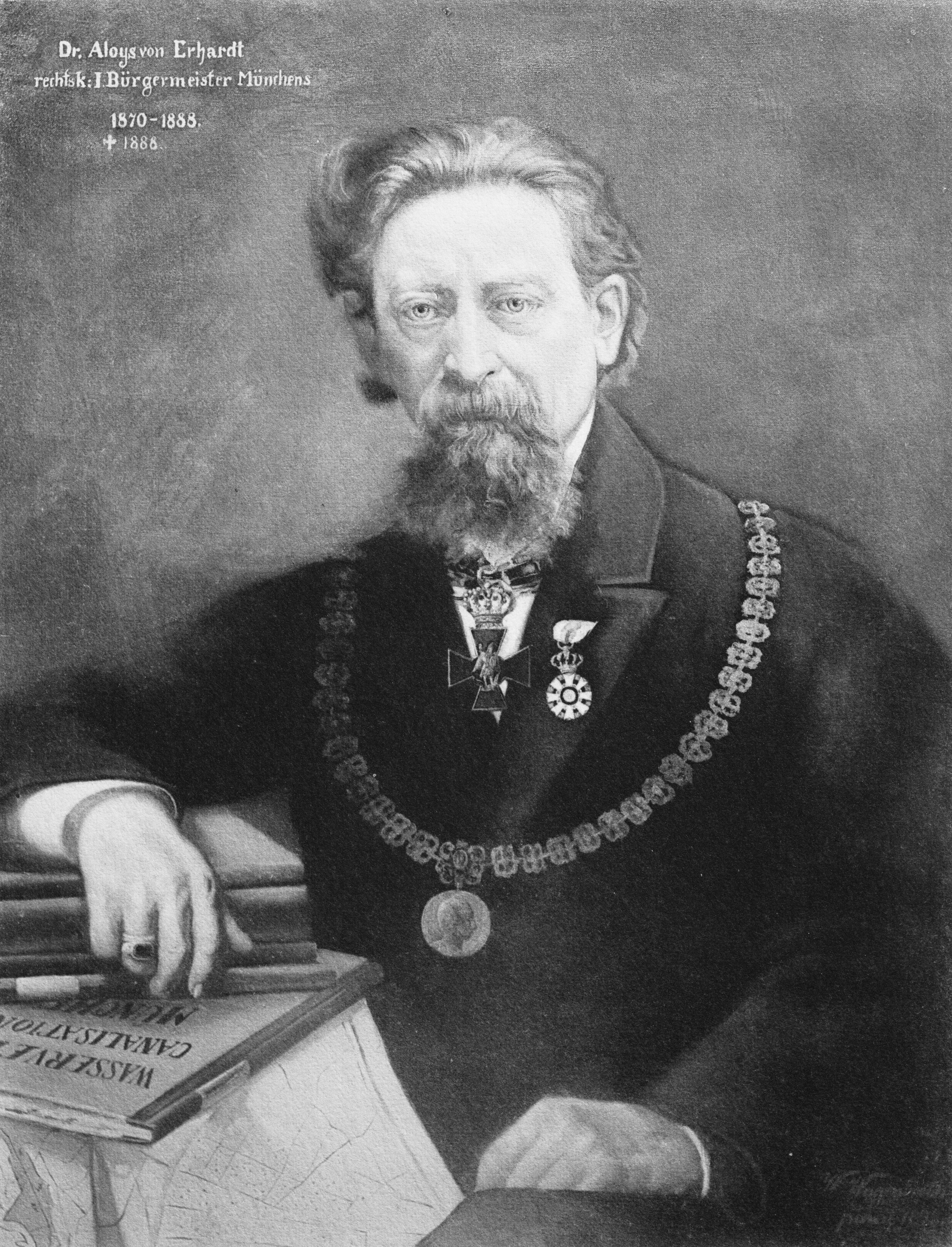Alois von Erhardt
Alois von Erhardt (born June 16, 1831 in Speinshart , † May 26, 1888 ) was a Bavarian politician .
Life
Erhard was the son of an elementary school teacher. He studied in Munich until 1854, where he became a member of the Corps Palatia Munich , and law in Erlangen. After his preparatory service in Eschenbach , he passed the state bankruptcy in 1856 and was then a lawyer in the Weiden law firm of Gustav von Schlör . In 1862 he entered the service of the Bavarian Eastern Railway Company, in 1866 he was admitted as a lawyer at the Deggendorf District Court, and in 1868 after moving to Munich at the District Court on the right of the Isar.
In Munich, Erhardt, who was petty German- minded and converted to the Old Catholic Church , joined the left-liberal German Progressive Party . He was first elected on December 9, 1869 to the community plenipotentiary college and on December 20, 1869 by the community plenipotentiaries to the first board. After the resignation of the previous mayor , the college elected Erhardt as his successor in 1870. After the municipal self-government had been significantly expanded with the municipal code of 1869 and the supervisory rights of the state had been restricted, Erhardt, a member of the liberal bourgeoisie, took over the mayor's office for the first time.
Erhardt held the mayor's office from June 14th, 1870 to December 27th, 1887. During his tenure, Munich experienced a doubling of the population and the transformation into a modern city in the course of industrialization . The focus in Erhardt's work was on improving hygienic conditions in the city. Erhardt was u. a. Founding member of the German Association for Public Health Care. It was, u. a. At the suggestion of Max von Pettenkofer, construction of the Munich sewer system began in 1880 , in 1883 the water supply in Munich was modernized with the supply of Mangfall water into the city and in 1878 a central slaughterhouse was built. In addition, with a concession agreement in 1876, Erhardt managed to operate two horse-drawn tram lines, which were incorporated into the Münchener Trambahn-AG in 1882 and became the starting point for the Münchner Verkehrsgesellschaft . During his term of office, the New Town Hall , which had begun in 1867, was also completed, which had become necessary due to the growing number of residents and the increasing municipal tasks.
Because of a serious nerve and brain disease, Erhardt submitted his resignation in December 1887. His successor was the previous Second Mayor Johannes von Widenmayer . In 1888 Erhardt received the Golden Citizen Medal of the City of Munich for his achievements before he died on May 26 of the same year.
The Erhardtstraße on the left bank of the Isar opposite the Museum Island is named after Alois von Erhardt . The two bridges leading to the Museum Island, Boschbrücke and Zenneckbrücke , were originally named the inner and outer Erhardtbrücke in his honor. A fountain was named after him on the Maximiliansbrücke .
Individual evidence
- ^ Well list
- ↑ cf. Eckhard Hansen, Florian Tennstedt (Eds.) U. a .: Biographical lexicon on the history of German social policy from 1871 to 1945 . Volume 1: Social politicians in the German Empire 1871 to 1918. Kassel University Press, Kassel 2010, ISBN 978-3-86219-038-6 , p. 42 ( online , PDF; 2.2 MB).
- ^ Ingo Schwab, Manfred Peter Heimers: The legal scholar and the city hygienist. In: Bavarian State Newspaper. February 22, 2008.
further reading
- Manfred Peter Heimers: Alois von Erhardt, 1870 - 1887. In: Friedrich H. Hettler, Achim Sing (Hrsg.): The Munich Lord Mayors . Volk Verlag, Munich 2008, ISBN 978-3-937200-42-2 , pp. 57-64.
Web links
| personal data | |
|---|---|
| SURNAME | Erhardt, Alois von |
| BRIEF DESCRIPTION | German politician and mayor |
| DATE OF BIRTH | June 16, 1831 |
| PLACE OF BIRTH | Super tough |
| DATE OF DEATH | May 26, 1888 |



